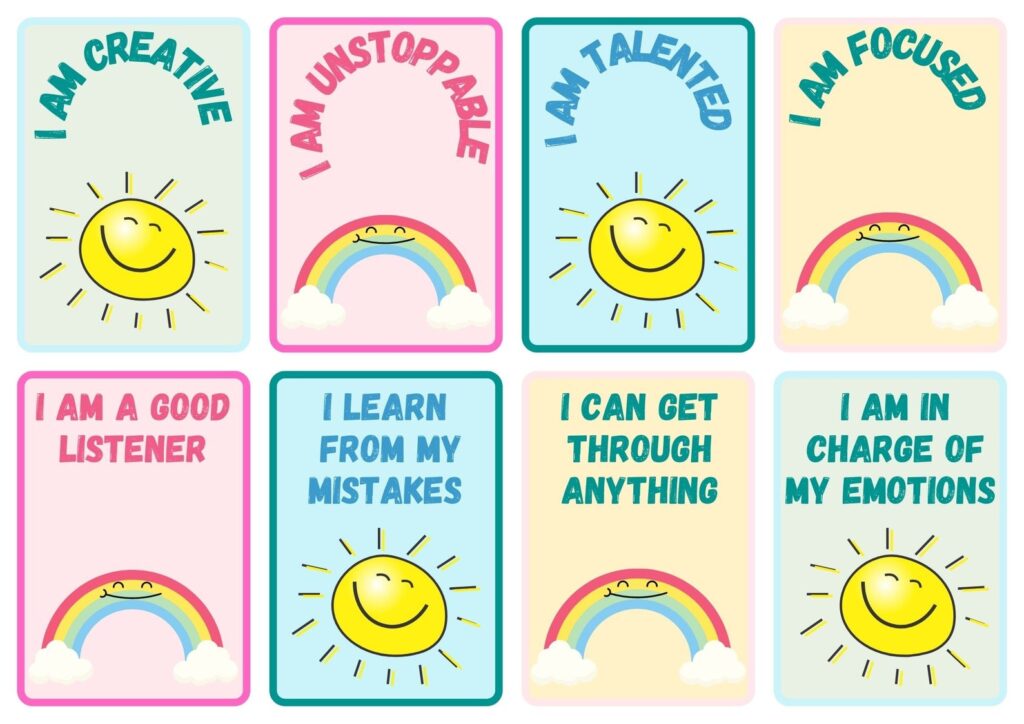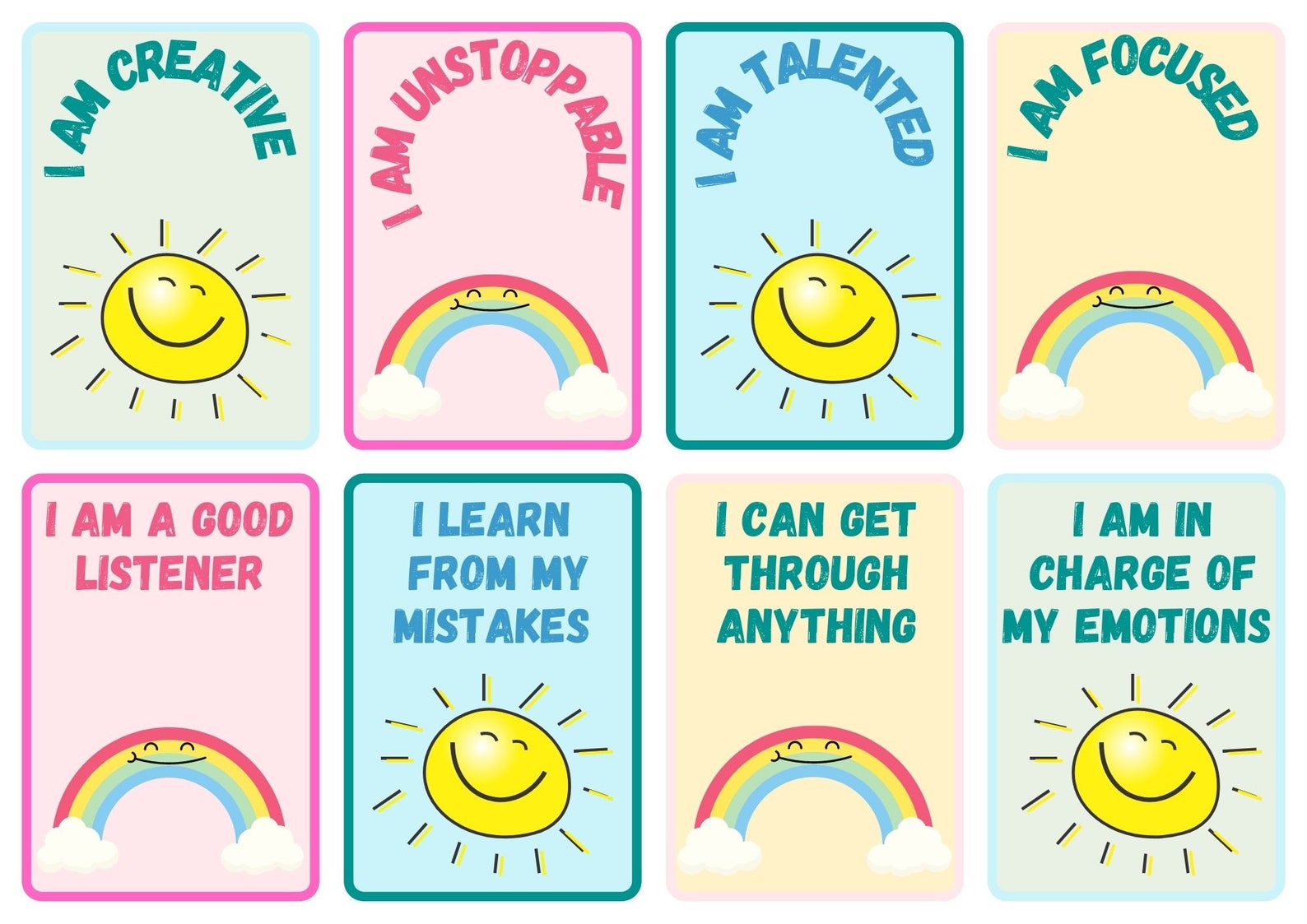
Empowering Young Minds: Daily Affirmations for Kids and Their Benefits
In today’s fast-paced world, children face numerous challenges that can impact their self-esteem and overall well-being. One powerful tool that can help them navigate these challenges is the practice of daily affirmations for kids. These positive statements, repeated regularly, can foster a sense of self-worth, resilience, and optimism. This article delves into the significance of daily affirmations for kids, providing practical examples and exploring their profound benefits.
Understanding the Power of Affirmations
Affirmations are positive statements that aim to challenge negative thoughts and replace them with more constructive and empowering beliefs. For children, who are still developing their sense of self, affirmations can be particularly impactful. By consistently repeating positive statements, kids can internalize these messages and cultivate a more positive self-image. The concept is rooted in cognitive psychology, suggesting that repeated positive input can reshape thought patterns over time.
The human brain is incredibly adaptable, a characteristic known as neuroplasticity. When children consistently engage with daily affirmations for kids, they are essentially rewiring their brains to prioritize positive thoughts and beliefs. This process can lead to increased self-confidence, improved emotional regulation, and a greater sense of overall well-being.
Benefits of Daily Affirmations for Kids
The benefits of incorporating daily affirmations for kids into their routine are numerous and far-reaching. Here are some key advantages:
- Boosted Self-Esteem: Affirmations help children recognize their strengths and value their unique qualities.
- Increased Confidence: By focusing on their abilities and potential, affirmations empower children to take on new challenges with greater confidence.
- Improved Emotional Regulation: Affirmations can help children manage their emotions by providing a sense of calm and control during stressful situations.
- Enhanced Resilience: Positive self-talk can help children bounce back from setbacks and failures with greater resilience.
- Reduced Anxiety: Affirmations can alleviate anxiety by promoting a sense of security and self-assurance.
- Cultivated Optimism: By focusing on the positive aspects of their lives, affirmations help children develop a more optimistic outlook.
- Better Focus and Concentration: A positive mindset can improve focus and concentration, leading to better academic performance.
Examples of Daily Affirmations for Kids
Here are some examples of daily affirmations for kids, categorized by specific areas of focus:
Affirmations for Self-Love and Acceptance
- I am loved and valued.
- I am unique and special.
- I accept myself for who I am.
- I am kind to myself and others.
- I am proud of who I am becoming.
Affirmations for Confidence and Courage
- I am brave and strong.
- I can do anything I set my mind to.
- I believe in myself.
- I am capable and competent.
- I am not afraid to try new things.
Affirmations for Emotional Well-being
- I am in control of my emotions.
- I can handle difficult situations.
- I am calm and peaceful.
- I am grateful for what I have.
- I choose to be happy.
Affirmations for Success and Achievement
- I am smart and capable.
- I am a good learner.
- I can achieve my goals.
- I am focused and determined.
- I am successful in everything I do.
How to Incorporate Daily Affirmations into a Child’s Routine
Integrating daily affirmations for kids into their daily routine can be simple and enjoyable. Here are some practical tips:
- Start the Day with Affirmations: Encourage children to repeat affirmations first thing in the morning to set a positive tone for the day.
- Make it a Family Activity: Practice affirmations together as a family to create a supportive and encouraging environment.
- Use Visual Aids: Create affirmation posters or cards that children can display in their rooms as visual reminders.
- Incorporate Affirmations into Storytime: Read books that reinforce positive messages and encourage children to repeat affirmations along with the characters.
- Practice Mindfulness: Combine affirmations with mindfulness exercises to enhance their effectiveness. [See also: Mindfulness for Children: A Practical Guide]
- Lead by Example: Children learn by observing the adults in their lives. Practice your own affirmations to model positive self-talk.
- Tailor Affirmations to Specific Needs: Customize affirmations to address specific challenges or areas where a child needs extra support.
Making Affirmations Effective
To maximize the effectiveness of daily affirmations for kids, consider these key factors:
- Keep it Simple: Use clear and concise language that children can easily understand.
- Make it Personal: Tailor affirmations to reflect a child’s unique strengths and aspirations.
- Use Positive Language: Focus on what you want to achieve, rather than what you want to avoid.
- Repeat Regularly: Consistency is key. Encourage children to repeat affirmations daily for best results.
- Believe in the Message: Affirmations are most effective when children genuinely believe in the statements they are repeating.
- Address Underlying Issues: Affirmations are not a substitute for professional help. If a child is struggling with significant emotional or behavioral issues, seek guidance from a qualified therapist or counselor.
Addressing Common Concerns
Some parents may have concerns about the effectiveness of daily affirmations for kids or worry that they might be perceived as insincere. It’s important to address these concerns with accurate information and realistic expectations.
Affirmations are not a magic bullet. They are a tool that can support positive self-development when used consistently and in conjunction with other strategies, such as building strong relationships, fostering a growth mindset, and providing opportunities for success. It’s also crucial to ensure that affirmations are genuine and aligned with a child’s actual experiences and abilities. Forcing a child to repeat affirmations that they don’t believe in can be counterproductive.
The Science Behind Affirmations
While anecdotal evidence and personal experiences often highlight the benefits of daily affirmations for kids, scientific research also supports their effectiveness. Studies in neuroscience have shown that positive affirmations can activate specific regions of the brain associated with self-related processing and reward. This suggests that affirmations can influence our thoughts, feelings, and behaviors at a neurological level.
Furthermore, research in positive psychology has demonstrated the link between positive self-talk and improved mental and emotional well-being. Individuals who engage in regular self-affirmations tend to experience lower levels of stress, anxiety, and depression, and they are more likely to exhibit resilience in the face of adversity. [See also: The Science of Positive Psychology and Its Applications]
Conclusion: Nurturing a Positive Mindset
Daily affirmations for kids are a valuable tool for nurturing a positive mindset and fostering self-esteem. By incorporating these positive statements into their routine, children can develop a stronger sense of self-worth, resilience, and optimism. While affirmations are not a substitute for professional help, they can be a powerful complement to other strategies for promoting mental and emotional well-being. As parents and educators, we have a responsibility to empower children with the tools they need to thrive, and daily affirmations for kids are a simple yet effective way to do just that.

